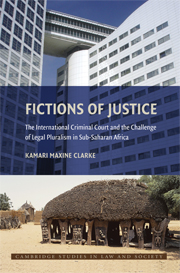 Fictions of Justice
Fictions of Justice Book contents
- Frontmatter
- Contents
- Preface
- Acknowledgments
- Introduction: The Rule of Law and Its Imbrications – Justice in the Making
- PART ONE THE PRODUCTION OF LIBERALIST TRUTH REGIMES
- PART TWO THE RELIGIOUS POLITICS OF INCOMMENSURABILITY
- Epilogue: Toward a Critical Transnational Legal Pluralism
- Notes
- Bibliography
- Index
- CAMBRIDGE STUDIES IN LAW AND SOCIETY
Introduction: The Rule of Law and Its Imbrications – Justice in the Making
Published online by Cambridge University Press: 23 January 2010
- Frontmatter
- Contents
- Preface
- Acknowledgments
- Introduction: The Rule of Law and Its Imbrications – Justice in the Making
- PART ONE THE PRODUCTION OF LIBERALIST TRUTH REGIMES
- PART TWO THE RELIGIOUS POLITICS OF INCOMMENSURABILITY
- Epilogue: Toward a Critical Transnational Legal Pluralism
- Notes
- Bibliography
- Index
- CAMBRIDGE STUDIES IN LAW AND SOCIETY
Summary
PROLOGUE: THE INTERNATIONAL CRIMINAL COURT AND THE DEMOCRATIC REPUBLIC OF THE CONGO
In November 2006, the International Criminal Court (ICC) – in pursuit of the quest for justice – began its first-ever hearing before the Pre-Trial Chamber. Thomas Lubanga Dylio, the accused, was charged with using child soldiers to commit violent murders. The prosecution presented him as the alleged leader of a Congolese militia responsible for ethnic massacres, torture, and rapes in the eastern part of the Democratic Republic of the Congo (DRC). Jean Flamme, the lead defence attorney for Lubanga at the time, countered by characterizing his client as a nonviolent man, a shepherd who wanted to lead his flock to peace and whose principal goals were to secure ethnic reconciliation and the equitable distribution of natural resources within the DRC. Lubanga “is a patriot,” Flamme contended. “He is a man who wants to defend his people.” Portraying Lubanga as a pacifist politician, Flamme maintained that tribal conflict in Congo's “lawless” Ituri region was so violent that people were often hacked to death and sometimes even eaten in the years before Lubanga managed to forge peace in 2003. Lubanga was described as having “entered the political realm by chance in a country that was in chaos.…[H]e was considered a man who was able to put an end to the violence.” According to Flamme, the reality was that Lubanga, by advocating equitable distribution of Congo's vast mineral wealth, had upset powerful business opponents in both Congo and neighboring Uganda.
- Type
- Chapter
- Information
- Fictions of JusticeThe International Criminal Court and the Challenge of Legal Pluralism in Sub-Saharan Africa, pp. 1 - 42Publisher: Cambridge University PressPrint publication year: 2009
